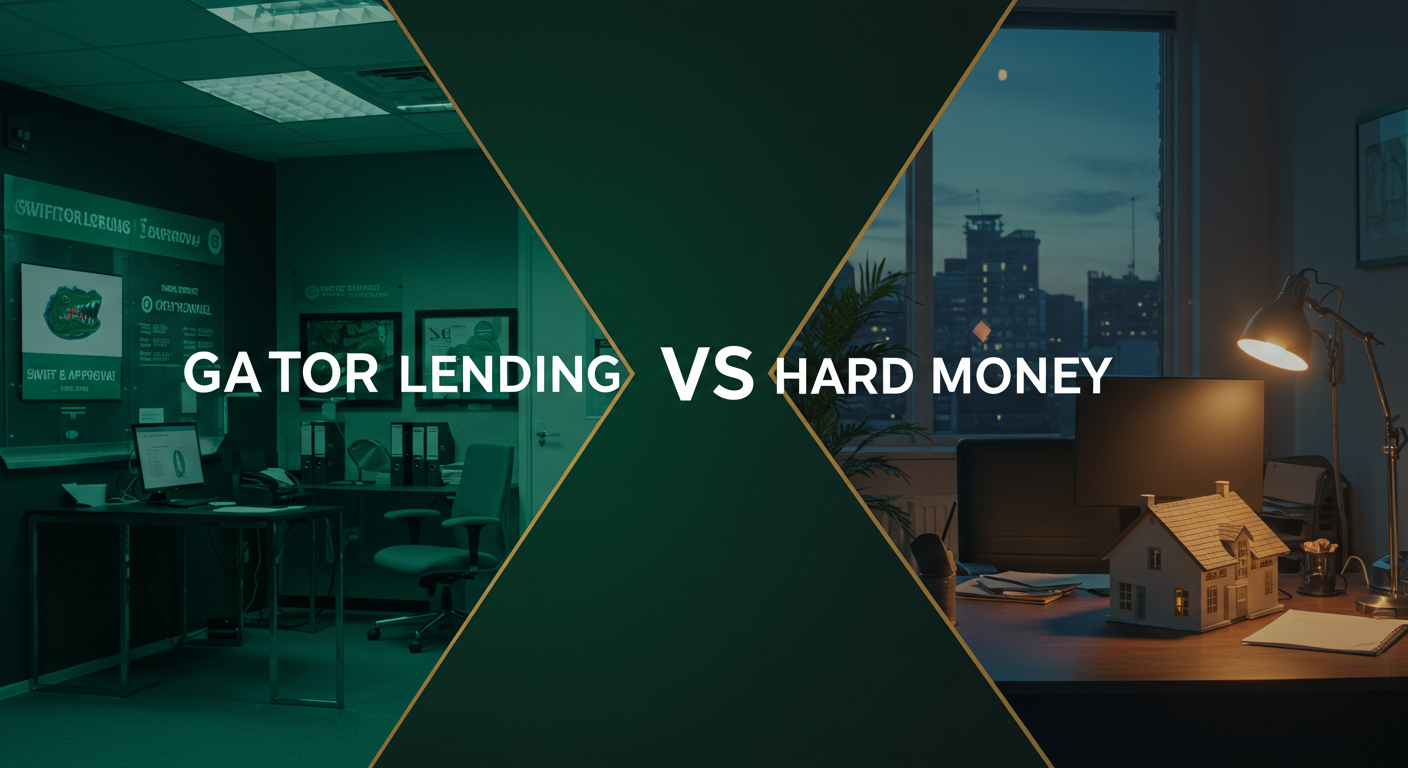In real estate financing, Gator Lending and hard money loans each serve unique purposes based on your needs. Gator Lending provides fast cash for earnest money deposits without credit checks, ideal for wholesalers and those in need of swift closings. Its speed, low fees, and flexible terms offer a competitive edge in fast-paced markets. Meanwhile, hard money loans, though requiring more documentation and higher interest rates, focus on property as collateral, suiting investors with rehabilitation projects in mind. Carefully consider interest rates, risks, and your investment goals. This foundational understanding prepares you for informed decision-making.
Key Takeaways
- Gator Lending offers faster, same-day funding compared to the typically longer process of hard money loans.
- Hard money loans require thorough assessments, focusing on property value rather than borrower creditworthiness.
- Gator Lending features lower interest rates, ranging from 0% to 12%, enhancing cost-effectiveness.
- Hard money loans have higher interest rates of 8% to 15%, which may reduce profit margins.
- Gator Lending is ideal for quick acquisitions, while hard money loans suit long-term property investment strategies.
Understanding Gator Lending
When examining gator lending, it is vital to understand how it provides a rapid financial solution for investors seeking earnest money deposits (EMDs). Gator lending offers quick access to funds, enabling you to secure properties swiftly without tapping into personal capital. This approach is particularly advantageous in competitive markets where speed is significant. Unlike hard money loans, which require collateral and involve a traditional application process, gator lending focuses on providing short-term capital solutions with minimal documentation. One of the standout features of gator lending is its ability to offer same-day funding for real estate transactions. This immediacy is a significant advantage over hard money loans, where approval times can be prolonged due to stringent underwriting criteria. By facilitating quicker deal closures, gator lending positions you to act decisively in fast-paced environments. Another benefit you’ll appreciate with gator lending is its flexibility. While hard money loans usually demand extensive documentation and credit checks, gator lending emphasizes relationship-building within the real estate community. This approach reduces bureaucratic hurdles, making it easier for you to access necessary funding. Moreover, gator lending tends to have lower fees compared to the higher interest rates and additional closing costs associated with hard money loans, which can range from 8% to 15%. This cost-effectiveness, combined with the speed and ease of access, makes gator lending an appealing choice for wholesalers and investors aiming to leverage short-term capital solutions efficiently. Additionally, gator lending can be an effective creative financing solution for those looking to acquire properties with minimal upfront costs.
Key Features of Hard Money
While gator lending offers speed and flexibility, hard money lending also plays a significant role in real estate financing with distinct characteristics. Hard money loans are a type of short-term financing that provide real estate investors with quick access to funds, often within a few days. This speed is essential for investors looking to capitalize on time-sensitive opportunities.
Hard money lenders focus primarily on the value of the collateral, which is the property itself, rather than the borrower’s creditworthiness. This makes such loans accessible to investors with poor credit or limited financial history. Because of the emphasis on collateral, the loan-to-value (LTV) ratios typically range from 60% to 80%, guaranteeing lenders’ risk is mitigated.
Interest rates for these loans are significantly higher than traditional financing, typically ranging from 8% to 15%. This reflects the increased risk undertaken by lenders, but it also underscores the importance of weighing costs against the benefits of quick funding and less stringent documentation requirements. The average interest rate on private loans is around 12.5%, which is crucial for investors when calculating their profit margins.
Although hard money loans require less documentation than conventional loans, an appraisal of the property is often still necessary. This process confirms that the property value aligns with the lender’s expectations and the proposed loan amount.
Key features include:
- Quick access to funds: Funding often occurs within days, allowing investors to act swiftly.
- Collateral-focused lending: Emphasizes property value over creditworthiness.
- Higher interest rates: Ranges from 8% to 15%, reflecting lender risk.
- Flexible documentation: Requires less paperwork, though appraisals are common.
Gator Lending vs Hard Money

As you compare loan terms between gator lending and hard money loans, it’s crucial to recognize the distinct advantages each offers. In the domain of real estate investing, the Gator Method emphasizes speed and flexibility, providing same-day funding for earnest money deposits. This approach suits investors needing quick transactions, particularly when engaging in transactional funding. With gator lending, you’re looking at creative financing options that often bypass the need for extensive documentation or credit checks, streamlining the process for real estate investors.
On the other hand, hard money loans present a more traditional route, albeit with higher interest rates, typically ranging from 8% to 15%. These loans require thorough assessments of both the borrower’s financial history and the property value, ensuring a level of security for the lender. While this can lead to longer waiting periods, it also provides a structured approach that many investors might find reassuring.
Gator lending’s loan terms excel in offering short-term arrangements, ideal for real estate wholesalers or investors needing rapid capital access for earnest money deposits. This flexibility contrasts with the fixed repayment schedules of hard money loans, which are often planned over a set period. However, these structured terms might better suit those pursuing long-term investment strategies or property renovations.
Ultimately, your choice between gator lending and hard money loans should align with your specific real estate investment goals. If you prioritize speed and flexibility, gator lending’s creative financing solutions can be invaluable. Conversely, if you seek a more traditional, structured approach with potentially broader applications, hard money loans might be your preferred option.
Legalities and Compliance
Understanding the legalities and compliance requirements of gator lending and hard money loans is vital in making well-informed financial decisions. Both lending practices are legal in the United States, provided they adhere to established financial regulations. In gator lending, including Earnest Money Deposit (EMD) financing, you’ll find that companies must be registered and compliant. This guarantees the process aligns with state and federal regulations, allowing for quicker fund access without the need for extensive documentation. Real estate investors can benefit from essential legal resources to ensure their transactions comply with all necessary regulations and to protect their investments. Hard money loans, while also legal, involve stricter guidelines. These loans often demand property appraisals and credit checks, complicating the process. Due diligence becomes essential to maneuvering these complexities. Gator lending’s transactional funding, although recognized legally, might face hesitation from title companies due to simultaneous closings.
To confirm compliance and avoid potential scams or legal issues, verification of the lender’s legitimacy is essential for both gator lending and hard money loans. Here are some important considerations:
- Verify Registration: Confirm that the lending company is registered with appropriate state and federal authorities.
- Conduct Due Diligence: Thoroughly review all legalities and financial regulations involved in the transaction.
- Consult Title Companies: Check their stance on transactional funding to anticipate any issues with simultaneous closings.
- Evaluate Requirements: Understand the differing requirements, such as appraisals and credit checks, associated with hard money loans.
Investor Benefits and Risks

Investors evaluating gator lending and hard money loans must weigh the benefits and risks to make informed decisions. Gator lending provides quick financing for earnest money deposits (EMDs) without credit checks, which can be advantageous for cash-strapped investors. This immediate access to funds can facilitate faster deal closures in competitive markets. In contrast, hard money loans typically involve more stringent qualification criteria and can take longer due to lengthy approval processes. However, they offer more structured financing with defined terms, which some investors might prefer for stability.
Interest rates are a critical factor when considering these options. Gator lending interest rates range from 0% to 12%, potentially offering lower costs compared to hard money loans, which generally have rates between 8% and 15%. Lower interest rates can greatly impact overall investment costs and cash flow. However, investors need to be wary of potential gator fees that could increase overall deal costs, similar to how origination fees can add to the financial burden of hard money loans. For those interested in diversified portfolios without ownership, Real Estate Investment Trusts are a viable option, providing a passive investment choice.
Both financing options come with their risks. Gator lending, while flexible and low in upfront costs, may create dependency on external funding sources. This reliance could impact cash flow and lead to increased closing costs if not managed carefully. Hard money loans, on the other hand, offer defined terms but at higher interest rates, which could strain cash flow if not calculated precisely. Investors need to balance these risks against potential benefits to determine the most suitable financial strategy for their investment needs.
Choosing the Right Option
How can you determine which financing option suits your investment strategy best—gator lending or hard money loans? Real estate investors must weigh the benefits and constraints of both funding options to align with their specific needs. Gator lending offers quick financing, especially for earnest money deposits, which is essential for real estate wholesalers who need immediate access to funds. This makes it an attractive choice if you’re focused on short-term financing without the hassle of credit checks, particularly if you’re dealing with limited credit history. In contrast, hard money loans are more suitable for acquiring and rehabilitating distressed properties, providing a more traditional structure with collateral and repayment terms. These loans often require a thorough evaluation of your creditworthiness and involve higher interest rates, typically ranging from 8% to 15%. However, they offer substantial capital for property investment, which can be an advantage in the real estate industry. Consider the following when choosing between these funding options: – Speed of Access: Gator lenders provide quicker funding, ideal for immediate needs like earnest money deposits. – interest rates: Gator lending typically offers lower rates compared to hard money loans, which can be a deciding factor if minimizing costs is vital. – Credit Requirements: If you lack a strong credit history, gator lending’s lack of credit checks can be beneficial. – Investment Focus: Decide if your primary goal is short-term wholesaling or long-term property investment, as this will guide your choice. Real estate agents can facilitate negotiation and documentation for seller financing, ensuring a smooth transaction by structuring deals and maintaining transparency.
Conclusion
In the domain of real estate financing, picture Gator Lending as a swift river, offering flexibility and quick access, while Hard Money stands as a solid bridge, providing structure and stability. Your choice depends on your journey’s needs—speed and adaptability or steadfast support. Weigh the risks and benefits of each path carefully. Ultimately, selecting the right financial tool is akin to choosing the best vessel for your voyage, ensuring a safe and prosperous arrival.




